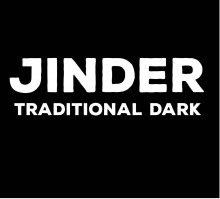It must be something in the water. I am otherwise at a loss as to how I might explain the musical creativity that flows so freely from the town of Bridport. The latest musical offering to pass across my desk is ‘Traditional Dark’ from Jinder. And Jinder has been imbibing deeply of the waters.
To be truthful Jinder was born in Oxfordshire, but such is a minor detail. Of more interest is his musical pedigree. He worked as a solo artist from the late 1990s before teaming up in 2002 with Daniel Minshull, Rick Porter and Mark McComish to form Candlefire. He left in 2003 to continue as a solo artist and to do some collaborative work with Nick Cull, before going solo again in 2004. In 2006 he formed The Mercurymen with Gavin Wyatt and Simon Johnson before going solo once more in 2009. Under these various guises Jinder has eight CDs under his belt, plus three EPs. They are all critically acclaimed and deservedly so.

Which brings me neatly to his ninth CD, ‘Traditional Dark’, the subject of this review?
I have to admit that I approached it with some trepidation. First of all, Jinder asked me to review it. So I was in something of a fret that I might not like it. How on earth would I be able to express that? I quickly dispelled such fear by acknowledging that I am a callous and brutal soul, devoid of compassion, should honesty require me to speak in such a vein. Second, Jinder had told that he had recorded direct to tape on an, “ancient Fostek four-track”. I am a digital geek. But he sounded quite proud of the result, so I loaded the CD into my deck and sat back…
Confession time: I have not heard Jinder until this moment! I have heard of him. He and I are Facebook friends, but I have never met him. I have seen pictures. He races go-karts for a hobby, which makes me envious. I am told he is very tall.
And my word can he sing! His voice is smooth as velvet. His diction is superlative. It is not affected, it is not stilted. It flows easily and naturally. There is no doubt as to the words Jinder is singing. His guitar playing is precise and his choice of progressions is as eloquent as his turn of phrase. The narrative is as important as the melody, they weave and intertwine, threading through your mind a tapestry of precisely what Jinder intends you to hear, see and understand. You might allow your emotions to colour as you will, but the images are unambiguous.
There are eight tracks, nine songs (I’ll explain later) and Jinder variously uses a variety of acoustic guitars, the main one being a 1999 Takamine EAN20C. The electric work is done on an Epiphone Casino (borrowed from Peter James Milson) played through a Boogie Studio .22 (borrowed from Jim Price). Jinder plays bass on an, “ancient Hohner bass that I resurrected after being given it as a non-runner by Martin Davies of Shelby’s Elbows”. A couple of Recording Kings also crop up in the mix. I do love hearing about the mish-mash of kit that musicians use on their albums. Jinder did not disappoint!
The first track is ‘New Maps of Hell’ a song about progress in in the face of adversity and the trades one has to make between birth and death. It is a dark song indeed, but delicately played. The second track is ‘May Your Train Roll On’ and it does indeed roll on in an upbeat and cheery mode with a definite country swing. I think this is the weakest track on the album and I’d have chopped the last minute (told you I was brutal!). Next up is a song about wanting better, reward for endured pain, recompense for discontentment, ‘Keys To The World’; or is it about unrealistic expectation? ‘Stations In The Valley’ is a mournful song of memory and realisation, beautifully played and hauntingly sung. Restless resentment of continual travel, thinking of loved ones lost or just left behind, unattainable in either case, ‘I Remember Home’ is a masterful evocation of appreciation of beauty and beautifully played. ‘Boil The World’ is a protest song, railing against global warming and senseless injustice. It rages. It is an angry song. I am skipping the next track for now, but I won’t forget it. The CD finishes with ‘Gathering My Children Home’ is beautiful. It is a perfect choice with which to close. It looks to the future with optimism and anticipation.
I skipped a track. It is called ‘Song for Jackie Leven’. It is a tribute to the late Scottish songwriter Jackie Leven who died of cancer in 2011. He and Jinder were great friends and Jinder wrote this song as tribute. These can so easily prove embarrassingly maudlin. Not so here. I rarely get a lump in the throat when listening to a song, but this one definitely got me. It is a worthy paen, a warm remembrance. Jinder has paired it with a delightful cover of Jackie Leven’s ‘Poortoun’.
I have to warn the reader that ‘Traditional Dark’ is not necessarily an easy album. It is fine listening and aesthetically pleasing, but it won’t have you skipping around the kitchen whistling the tunes. It is an album to listen to, not an album to have in the background. Like a Dylan Thomas poem, you have to work at, but that is a pleasure in its own right. It’s an album you want to go back to; an album you have to go back to.
Buy it. I recommend it with a passion.
“Traditional Dark” is published by Jinder and is released under copyright on the Din of Ecstasy label.
It can be ordered from the web site at http:www.jinder.co.uk.
Ian Sedwell, 28 February 2015












